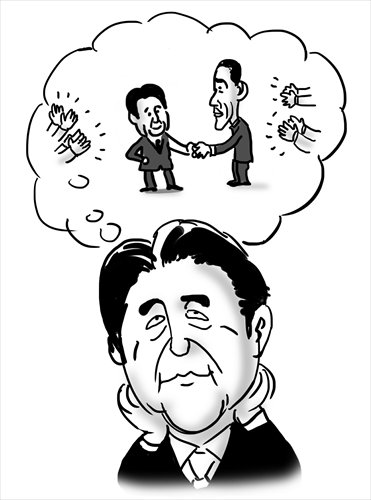Obama Hiroshima visit only minor win for Abe

Illustration: Liu Rui/GT
On April 10, US Ambassador to Japan Caroline Bouvier Kennedy posted a welcoming tweet to US Secretary of State John Kerry ahead of his Hiroshima visit. "Welcoming @JohnKerry to Japan for the #G7 FM meeting in #Hiroshima," she tweeted in both Japanese and English, and attached a photo of her son shaking hands with Kerry.
According to Japan's national public broadcaster NHK, President Barack Obama is scheduled to visit Hiroshima after he attends the G7 summit on May 27 at Ise-Shima. It's anticipated that Kennedy will post a similar welcoming tweet but with @POTUS in two weeks.
Obama's Hiroshima visit will add more highlights to the G7 summit. He will become the first serving US president to visit Hiroshima when he travels to Japan later this month. Jimmy Carter once visited Hiroshima, but that was after the end of his presidency. Therefore, his trip was not of the same historic significance as Obama's.
The abrupt announcement of Obama's Hiroshima visit two weeks prior to the G7 summit has surprised many. However, it's a well-designed plan and has been pushed forward step by step. Obama expressed his wish to visit Hiroshima or Nagasaki when he visited Japan in 2009. One year later, then US ambassador to Japan John Victor Roos represented the US government at a peace memorial ceremony in Hiroshima. Kennedy paid a visit to Nagasaki in 2013 and attended a ceremony at the Hiroshima Peace Memorial Park in August 2014. Last month, Kerry paid tribute to the victims of the first nuclear attack in Hiroshima. Against this backdrop, Obama visits Hiroshima to not only highlight his vision of a nuclear-free world, but also to fulfill his personal wish.
It's too early to tell the effects of the visit, but it's certain to become an important political legacy of Obama's tenure. As Obama's term is coming to an end, historic as his Hiroshima visit is, it will have limited influence on nuclear security and non-proliferation.
Since the end of WWII, US presidents have refrained from visiting Hiroshima or Nagasaki when they were in office mainly because of the US public opposition. Most Americans view the atomic bombings of Hiroshima and Nagasaki as a justified act that hastened Imperial Japan's surrender. According to a 2015 Pew Research Center survey conducted against the backdrop of the 70th anniversary of the end of WWII, the share of Americans who believe the use of nuclear weapons was justified is 56 percent, with 34 percent saying it's not. Therefore, the mainstream US society remains broadly supportive of the correctness of the atomic bombings.
However, the Japanese public has never forgotten that Japan is the sole victim of nuclear bombing. It hopes the US president could visit Hiroshima or Nagasaki, talk to the victims, reflect upon and apologize for the use of nuclear weapons. A poll by the NHK on May 9 shows that 70 percent of the respondents hope Obama could make a Hiroshima visit during the G7 summit. In this sense, Obama's Hiroshima trip may divide the US public opinion, but it will win overwhelming support of the Japanese public, scoring points for the administration of Shinzo Abe.
In his Hiroshima tour Obama will be reportedly accompanied by Abe. The trip could be regarded as the most prominent diplomatic achievement of the Abe administration so far since he assumed power in 2012. The prime minister came under the spotlight in May with a meeting with Russian President Vladimir Putin early this month as well as the upcoming G7 summit and Obama's Hiroshima visit. These will not only boost Abe's reputation among the public, but also improve the supporting rate of the Liberal Democratic Party (LDP).
Since the beginning of this year, Abe on many occasions has stated that he would not dissolve the lower house, nor would he hold a joint election of the lower and upper houses. However, it's very likely that Abe will break his promises, taking advantage of the momentum in diplomacy to further consolidate LDP's control over the National Diet.
It's easier for the Abe government to make diplomatic breakthroughs than it is to boost the economy. However, the Hiroshima visit will have limited influence on Japanese people's day-to-day lives. If Abe is still unable to resolve Japan's current economic predicament, he will quickly see a sharp decline in supporting rate.
The author is a PhD candidate at the Graduate School of Sociology at Toyo University. opinion@globaltimes.com.cn